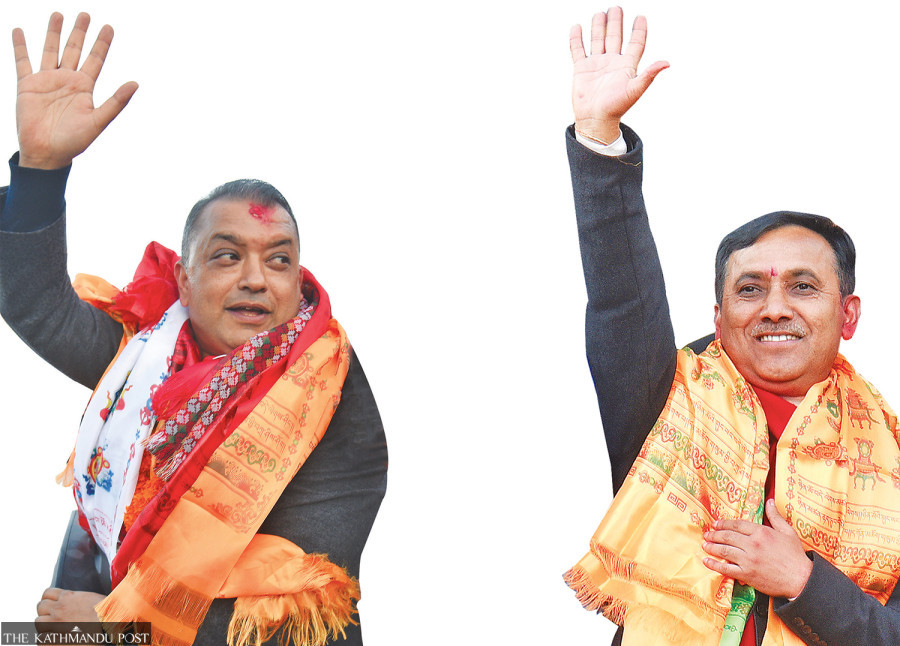Columns
The disoriented duo
With their script gone astray, Congress general secretaries Thapa and Sharma appear to have lost the plot.
Sanjeev Satgainya
Populism is contagious. More often than not, when the wave of populism rises, those who accuse others of being populist demonstrate an uncanny inclination to ride the same wave. And that’s the crux of the problem with populism.
Who rose to power in Nepal’s politics on the back of populism? Who criticised whom the most for being populist? Now, the situation is such that those who censured others are doing exactly the same.
Ring any bells?
Those who keep abreast of Nepal’s politics must have come across recent remarks by two prominent Nepali politicians: Gagan Thapa and Bishwa Prakash Sharma, both general secretaries of the Nepali Congress, the largest party in Parliament.
Thapa and Sharma are advocating for changes to the constitution to allow a party winning “popular” votes to govern for a full five-year term. Their argument stems from the belief that instability is the root cause of Nepal’s woes and that a “stable” government is the only solution.
It’s worth noting that the constitution amendment issue, let alone the duo’s latest proposal, came to the surface in July when Congress President Sher Bahadur Deuba and CPN-UML Chairman KP Sharma Oli, in a remarkable display of smoke and mirrors, signed a deal to that effect. Subsequently, Oli became the Prime Minister.
Oli’s statement on Sunday that the constitution would be revised only in 2087 BS (2030-31 AD) offers additional evidence that the charter revision promise was nothing but a flimflam.
The context
When Nepal’s major parties bulldozed the constitution in 2015, they should have understood—assuming they had read and grasped the document in both letter and spirit—that a majority government was highly unlikely in subsequent elections. The electoral system, which requires selecting 165 Members of Parliament through first-past-the-post and 110 through proportional representation, had already complicated matters. In a diverse country like Nepal, where myriad parties exist, a single party securing a majority was almost impossible.
Yet, the constitution’s spirit was clear: Even without a majority, coalition governments should be formed. Parties needed to internalise this principle, foster a culture of coalition-building and adhere to its philosophy. They failed.
Instead of prioritising the constitution’s implementation, Nepali parties indulged in a game of musical chairs, repeatedly forming and breaking governments. Oli, Deuba and Pushpa Kamal Dahal, who have alternated in power, delivered almost nothing in terms of governance.
Ten years have passed, and public disenchantment with political parties and their leadership has grown. As a result, parties are trying to weave new devious strategies. The constitution amendment ruse is one of them.
The instability refrain
That the constitution has managed to complete nine years, despite struggling to see its full implementation, is itself a sign of political stability. Frequent changes in government are not praiseworthy, but they do not necessarily signify instability. The real question is whether successive governments have delivered—and if not, what barriers have prevented them from doing so?
If Nepal is facing economic, social, or developmental problems, they stem from the increasing degradation of morality, culture and ethical values among Nepali politicians and parties, coupled with the rise of kleptocracy.
Yet the Congress and the UML are now condemning the proportional representation system for their inability to form a majority government, which is not just unethical but hypocritical. Needless to say, these same parties exploited this system, a hallmark of inclusivity, for their political expediency. Another fundamental failure lies in the inability of political parties to embrace coalition culture.
It was apparent from the start that beneath the Congress and UML’s promise of constitutional amendments lay a sinister intent to dismantle the proportional representation system. If successful, this move would be regressive and deal a significant blow to women and marginalised communities.
No matter how much these parties claim they would introduce an even stronger system to ensure representation, their past actions offer no basis for trust.
Bizarre proposals
If the charter is changed as Thapa and Sharma suggest, how would their envisioned “stable and strong government” perform? They have offered no answers—likely because they have none.
The problem with these two young leaders—one of whom, Thapa, aspires to become party president and eventually prime minister—is their acute inconsistency. The Congress has long claimed to champion democracy, having led the movement for multiparty democracy’s restoration. Yet, Thapa and Sharma’s proposals undermine both the constitution’s principles and their party’s democratic ethos.
Last year, Sharma made a bizarre proposal at his party meeting, demanding term limits for parliamentary members and prime ministers—four terms for MPs and two for prime ministers. The proposal lacked clarity on its applicability yet drew largely positive responses due to growing public frustration with the same old faces.
Thapa’s inconsistency was also evident months ago when the Congress was in opposition. He claimed his party would remain in opposition until the next elections, only to be blindsided when Deuba struck a deal with Oli to form the government.
The duo’s idea of allowing a party with “popular votes,” even if short of a majority, to lead the government for five years reflects their lack of awareness of what their party president and Oli are cooking. It also amounts to shifting the goalposts. On top of that, their proposal negates the role of Parliament, to which the government of the day is accountable. It undermines parliamentary supremacy and risks rendering Parliament dysfunctional. Such a provision sows the seeds of authoritarianism through elections. Moreover, their argument for embedding this in the constitution is fundamentally flawed.
Lost plot
If Thapa and Sharma truly believe in democracy, they should focus on reforming their party and inspiring others to do the same, rather than pushing for constitutional amendments with outlandish ideas and steer clear of stale rhetoric.
Once considered Nepali politics’ forces to be reckoned with, the duo now risk becoming exhausted fighters, as if their quivers have run out of arrows. They thrived in politics for their way with words, but now, for lack of creativity and imagination, their once-impactful rhetoric has devolved into uninspired and inconsistent populism.
Instead of championing pressing issues—such as cautioning the government on crucial bills, pressing for a parliamentary session, addressing corruption and irregularities or prodding their own party for reforms—they are advocating for untimely and meritless constitutional changes.
It seems they have lost the plot so badly that their latest proposal amounts to a futile attempt to write a new one. While the script they are working on may sound magniloquent on the surface, it reeks of populist pandering—the very brand of politics they once opposed.




 23.12°C Kathmandu
23.12°C Kathmandu















